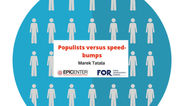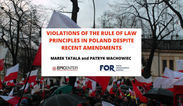-

Analiza 3/2020: Reakcje wybranych państw na COVID-19 | 2020-04-17
więcejPandemia COVID-19 jest poważnym wyzwaniem dla społeczeństw na całym świecie. W reakcji na nią ludzie zmieniają swoje zachowania, a rządy podejmują różnorakie działania publiczne. Aby porównać reakcje rządów różnych krajów, przy udziale partnerów zagranicznych zebraliśmy informacje z Bułgarii, Czech, Litwy, Gruzji, Niemiec, Grecji, Węgier, Polski, Słowacji, Słowenii i Wielkiej Brytanii. Przegląd działań publicznych w tych krajach wskazuje na występowanie zarówno obszarów wspólnych, jak i głębokich różnic.

Marek Tatała: Populists versus speed-bumps, Epicenter | 2019-03-05
In the 2019 edition of the Authoritarian Populism Index, which has just been published, populist parties are characterised by, among others, the creation of conflicts between “people” and “elites”, strong nationalism, tendencies to remove institutional restrictions on power, and anti-capitalism. Not all of these characteristics need to be shared, but the combination of several of them, according to Timbro, poses a threat to the model of liberal democracy in Europe.
-

Rafał Trzeciakowski, Marcin Zieliński: The Mass Demonstrations in France is a Reaction to the Effects of Interventionism, Not Liberalism, Epicenter | 2019-02-07
więcejMass protests of the “yellow vests” have been taking place in France since 17 November 2018. The catalyst of the demonstration was a fuel tax increase, supposed to place a disproportionate burden on the middle class from the province. However, the list of demands quickly grew to include various social and protectionist slogans. The protestors are demanding a simultaneous growth of the state and a reduction of taxes.
-

Marek Tatała, Patryk Wachowiec: Violations of the rule of law principles in Poland despite recent amendments, EPICENTER | 2019-01-14
więcejOn 21 November, public opinion in Poland and the EU was surprised by the ruling Law and Justice’s (PiS) proposal “backtracking on controversial reforms it made to lower the retirement age of Supreme Court judges”. The amendment was issued in the morning and it went through the whole legislative process in the lower house of parliament for less than 3.5 hours. President of Poland, Andrzej Duda, waited until 17 December and finally signed the new law which is the 7th amendment to the act on the Supreme Court since its enactment in late 2017.
-

